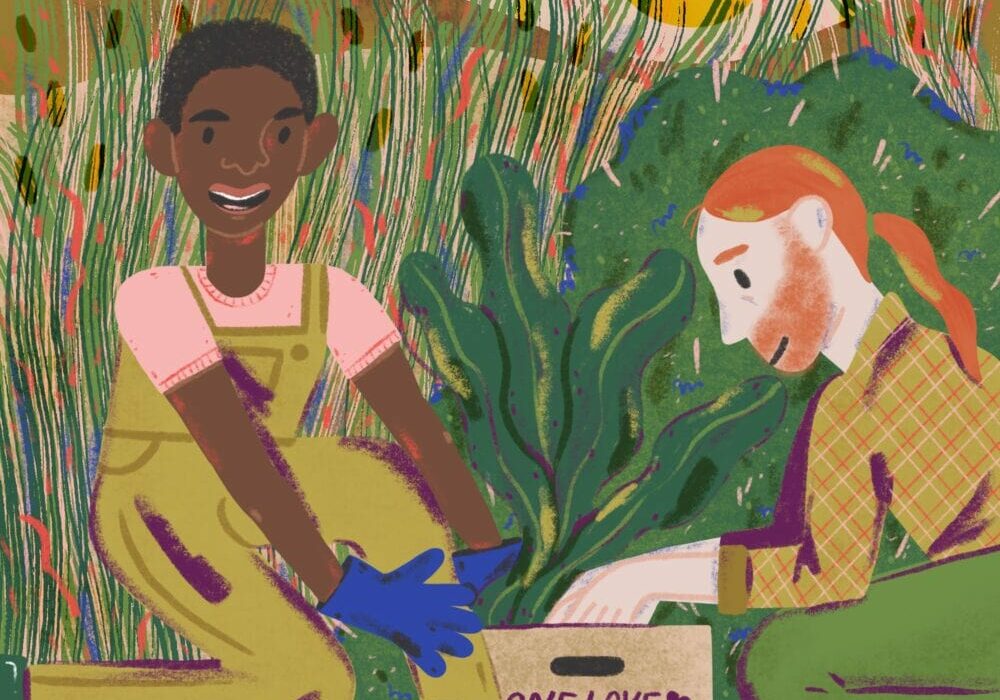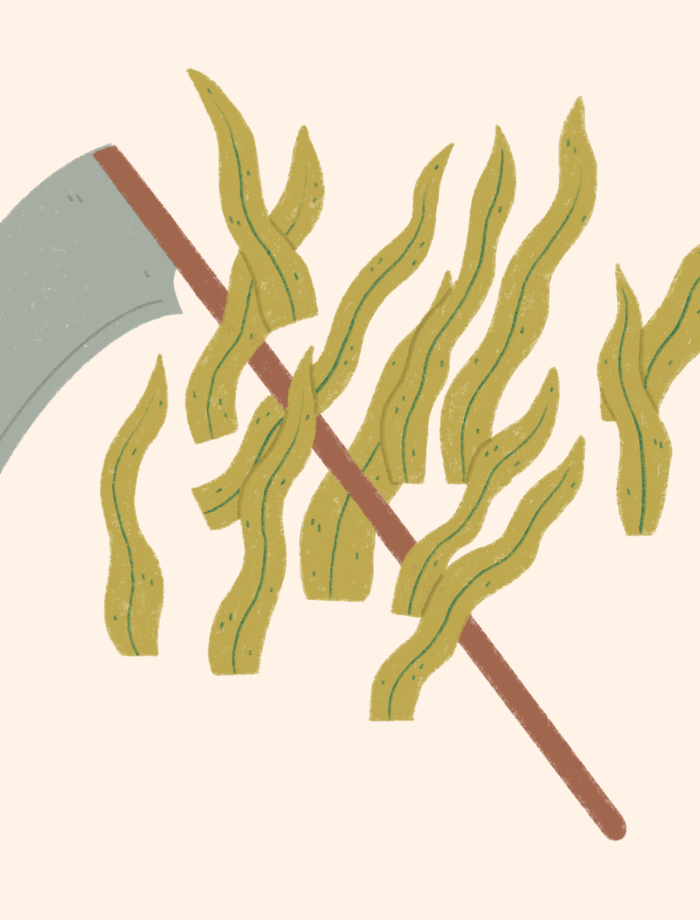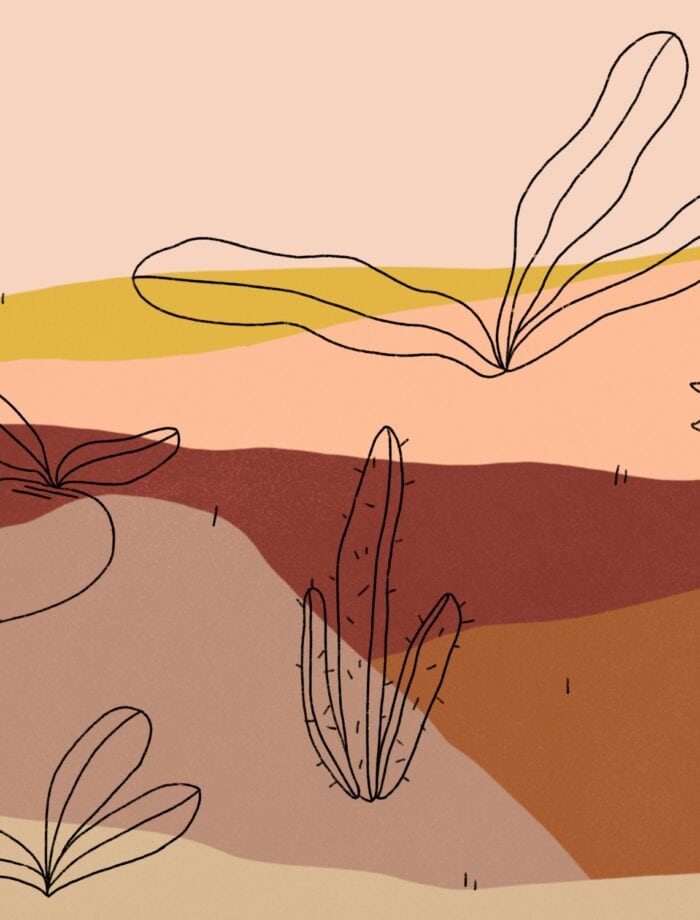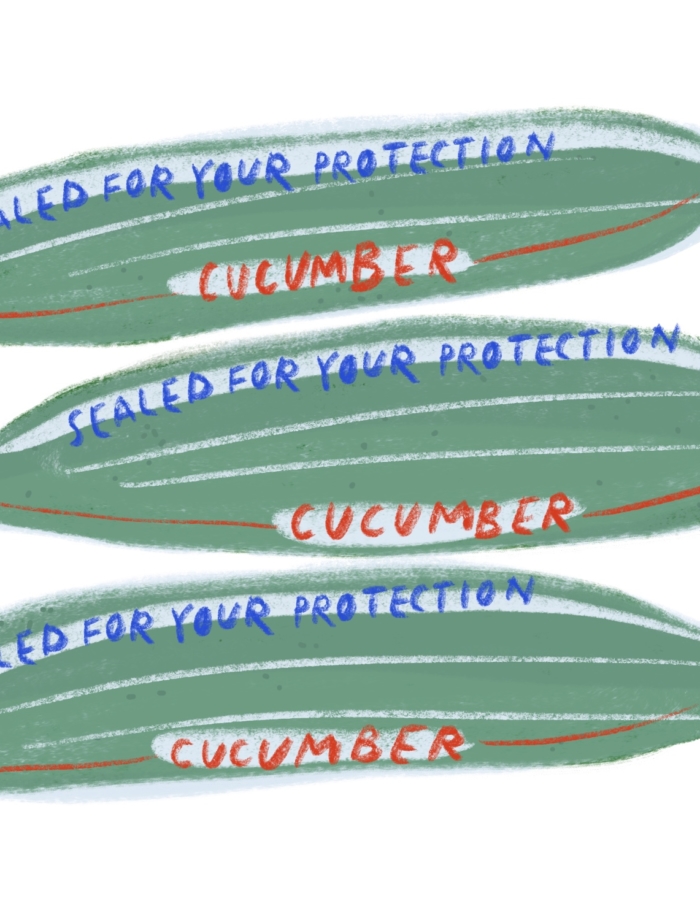Illustration by Hawnuh Lee.
Imagine waking up in a cabin in the woods, wandering down to a field of verdant leaves and vines, sipping fresh clean water, and experiencing the sensation of rich soil and living creatures around you. You take stock of the growing plants, and decide how you want to spend your time that day.
For Shannon Palmer and Andy Edwards, this is what a typical morning looks like. Shannon and Andy are the proud proprietors of One Love Garden, a small-scale organic farming operation in Maple City, Michigan that supplies heaps of nutrient-packed vegetables to local families every week.
It’s hard to believe that in 2016, these full-fledged farmers were just two New Yorkers with the sense that life had more to offer them than concrete and cramped apartments. Though summer is peak season for One Love (read: very long and strenuous workdays), Shannon and Andy generously took the time to share their story with the CLC fam. Our conversation reminded me of the magic that nature offers every one of us if we are curious enough to seek it out.
Five years ago neither of you had ever worked on a farm, and now you are running a successful business doing just that. Tell me about what happened in between.
Shannon: I’m originally from Brooklyn, and I studied nutrition and public health in school. I wanted to learn how to grow nutrient-dense food because depleted soils and lack of access to healthy foods are huge contributors to illness in this country.
Andy: I used to be a chef and was always interested in environmentalism, but I was living in the city and the meaningful opportunities to enact that—like volunteering at community gardens—just weren’t enough for someone who wanted to get as invested in it as I did.
I met Shannon when we were both working at a natural food store, and we both felt this need to get out of the city. It was springtime, we wanted to be in nature and breathe fresh air.
We started looking at last-minute farm job postings that summer and managed to find a really cool farm out in the middle of nowhere Pennsylvania that needed two farmhands right away. So we went out and gave it a shot. We were making less than minimum wage, living in a little cabin with no power and no running water, working six and a half days a week, but we fell in love with farming life.
“Learning how easy it is to opt out of those destructive practices and produce the same amount of food or even more was eye-opening for us.”
Shannon: It’s so fulfilling to be a part of a plant growing from seed all the way until harvest. All of the hard work is always worth it. I never thought farming would be working ten to twelve hours a day. Weeding, seeding… there is just so much to do and not a lot of downtime, but I’m so glad that we continued.
Andy: I think the most meaningful thing from that season, beyond it being our introduction to farming, was that we got to run a farmer’s market every Saturday in Southeast Washington D.C. That area is a majority Black neighborhood that has really been pushed to the margins. People would say to us, ‘Wow, I’ve never seen this vegetable before,’ or ‘I’ve heard of this food but I’ve never gotten the chance to try it,’ or ‘I know my grandparents used to cook with these things but we don’t have grocery stores here.’
We were able to provide them with fresh food through food stamp vouchers, and we developed a bidirectional relationship where they could tell us what specific types of produce best suited their needs, and we worked with our farmers to grow that and bring it to them.
We didn’t necessarily know that we could promote food justice in such a direct way as farmers. Seeing how much of an unmet need there was and how easy it is to start a farmer’s market in the middle of a parking lot was a lightbulb moment for us. We realized that we could ultimately start a farming operation not just to make money or grow beautiful food, but to enhance the lives of people around us.
Shannon: We were doing tons of reading to educate ourselves more about permaculture, and we learned about how destructive conventional practices are to the land. Tilling, for example, completely disrupts the microbiome of the soil. Learning how easy it is to opt out of those practices and produce the same amount of food or even more was eye-opening for us. We decided we wanted to learn more about indigenous farming practices, so we went to South America and volunteered at permaculture farms in Colombia and Ecuador.
“We have to show people that this is the reality of food—it grows the way it wants to, and it’s not always going to be perfect and shiny.”
Andy: At one of the farms in Ecuador there were four generations of women who were growing several truckloads of tomatoes a week, and we helped pick and prune the plants. It was so cool learning about tomatoes from the culture where the tomato was first cultivated—seeing the way that they trust the plants and the polyculture that those tomatoes grow along with. They coexist within a community of other crops. Most crops, even on organic farms here in the U.S. don’t grow in community with other plants. They don’t actually live a real plant life.
Shannon: Yeah, one of the amazing things we saw there was that instead of using pesticides, people actually use different plants, flowers, and herbs intercropped to keep bugs away. That’s something that we do at One Love Garden now also, like planting artemisia next to all of our brassicas. We are an organic farm but we consider ourselves beyond organic because we don’t spray anything at all, and we learned how to do that from these indigenous farmers.
Andy: We also worked with a farmer in Quito who was growing medicinal and culinary mushrooms. What we learned from him wasn’t so much the mycology technique, which you could find written out in books or online, but rather the way he created a self-sustaining operation where all of his different products and byproducts helped pull each other along. He would take the spent grain spawn and hay that he was growing the mushrooms on and reincorporate that into his compost, which he would use to grow food in their home garden. When areas of the soil in the garden needed to be replenished, he would switch them over from annual crops to perennials like herbal bushes and trees to produce essential oils, and then he used those oils to promote the growth of the mushrooms.
Once you had this understanding of how to grow food, how and why did you decide to start One Love Garden?
Shannon: We found a great opportunity to take over a piece of land for a recently retired farmer in northern Michigan. She offered us a cooperative deal where we grow crops for her family to eat, and in exchange we are able to farm here and start our own business.
The farm is in Leelanau County, which is pretty far from the communities that we ideally want to bring our market to—like those with limited food access in Grand Rapids. Right now we don’t have a vehicle of our own, we’re borrowing one that doesn’t actually fit the amount of food we’d like to haul, so it’s tricky. But we’re brainstorming and working on ways that we can make that happen. We currently run an online market for Traverse City and two physical markets locally.
“This is a human scale. This is something anyone could do.”
Our farm is only half an acre, and we’re growing more food than they did on the 5-acre farm we worked on last year. The practices we use here make it easier for anyone to be able to grow food in whatever space they have.
Andy: Right, we want to show people that we are really farming by hand. This is a human scale. This is something anyone could do. Honestly, it feels like our dreams are coming true. Yeah, we’re working long days, but we’re also spending most of our time outside, being nourished by the land, by other creatures, and by the way of life that we’ve chosen.
What do your dreams for the future of One Love Garden look like now?
Andy: We’re in this part of Michigan that has such a long history of agriculture, and we want to make a difference in the way people are operating around here. How do people with different specialties or different access to capital or land come together and say, ‘Hey, we can do this without having to rely on a giant external system.’
I think for us, long term happiness is going to come in the form of seeing our place in the food web, knowing not just that we have stability, but also that we’re helping others be more self-reliant. Local food sovereignty is something that’s really hard to pull off, especially in this country, given the policies and infrastructure that are designed to promote the opposite. But the problems with that are being exposed now during COVID. We’re seeing people flocking to local markets this summer, wanting fresh, dependable, high-quality food, not necessarily trusting these huge complicated supply chains anymore.
We hope to start a CSA as one of the ways to bring the community together. Joining a CSA is essentially choosing to own a piece of the farm’s equity or a share in the company, so that means that the customer also has a say in what we do. We provide a large percentage of their family’s food for the week, and they are purchasing the amount of food that maybe ten people would buy at a farmer’s market. There is a level of intensity and commitment to the CSA partnership.
CSA customers also get the chance to really know how the sausage gets made. They are going to see some stuff that has bug damage or that didn’t size up properly, and realize that what they’ve seen at the stores all these years is just cherry-picked.
“Sharing land, sharing food.”
Shannon: Wastefulness is something we noticed a lot on farms we worked on in the past. Farmer’s have this level of perfectionism where they literally throw away anything that has a tiny hole in it, or a carrot that’s twisted around another carrot, because it won’t sell at market. That’s hard to see when there are so many people who don’t have access to fresh produce at all. We have to show people that this is the reality of food—it grows the way it wants to, and it’s not always going to be perfect and shiny.
Andy: Another fun thing about the CSA is that customers get to try new things and we can share recipes for how to prepare them. It’s offering them the opportunity to eat like a farmer. Instead of thinking about what you want to make and going to the store to buy ingredients for that, it’s like, ‘Here’s what nature’s given to you, how are you going to transform it into something that’s going to nourish your family?’
Shannon: We would love to have a permaculture homestead with a garden-to-table cafe, to share good food with our community. We are saving up for that. The growing season is very short where we are right now in northern Michigan, so the next place we would look is probably going to be farther south.
Andy: We also would love to find partners and create a cooperative situation with people around our age who want to do similar things. It’s not about ownership, we just need to have a home.
Shannon: Sharing land, sharing food.
Andy: When we talk to our families about this they always say, ‘Oh, you want to start a commune?’ And we’re like, ‘Well yeah, but you could also just call it collectivism, or taking care of your people.’ We want to have ongoing conversations with people out there who were like us five years ago. We want them to know that they’re not alone, and they are not crazy for wanting to step outside of their block, or their group of friends, or whatever they think is attainable. We want them to realize that there is a whole world that’s out there waiting for them, and they can reach it.
Shannon and Andy are raising funds to keep One Love Garden growing. Please consider donating if you are able! You can also learn more about how they are working to build a more sustainable, equitable food system in the Midwest on Facebook and Instagram.



